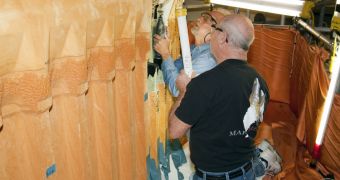Officials at the American space agency decided in a meeting held yesterday, January 6, to postpone the launch of space shuttle Discovery yet again, this time to late February. The spacecraft was supposed to blast off to the International Space Station (ISS) no earlier than February 3.
According to sources at NASA, there is currently no clear schedule on when the shuttle will be launched. That is to say, mission managers have yet to propose a new date.
At the meeting, mission managers were told simply that engineering crews at the Kennedy Space Center (KSC), in Florida, need more time to fix all of the cracks that appeared on the orbiter's orange external fuel tank (EFT).
These damages appeared in vulnerable areas of the tank, which means that the entire thing could go up in flames if the cracks are not properly taken care of. Discovery's launch has been constantly delayed since early November, when it was originally supposed to take off.
“There is no official target launch date right now. I would only characterize as late February as the next opportunity,” told Space yesterday Kyle Herring, a spokesman for NASA at the Johnson Space Center, in Houston, Texas.
The previous launch window NASA was aiming for opens on February 3 and remains opened through February 10. If Discovery did fly its STS-133 mission in November, then this launch window would have been used to launch Endeavor on its final flight.
But now the launch manifest has been delayed significantly. Endeavor is currently slated to launch in April, but that date could slip even farther into the year, if Discovery fails to launch this month.
The final shuttle flight, that of Atlantis, is currently scheduled to take place in June, although NASA is not yet sure the spacecraft will ever take off again. All remaining orbiter flights to the ISS are resupply missions that carry vital fuel, food, spare parts and scientific experiments to orbit.
Discovery's main cargo is a new Multipurpose Logistics Module (MPLM), and the Robonaut 2, a robot designed by General Motors and NASA to aid astronauts in orbit in completing demanding tasks.
Endeavor will carry the Alpha Magnetic Spectrometer (AMS) to the ISS. This is the largest particle physics experiment and particle detector ever flown to space, and experts hope to learn more about the makeup of the Universe by analyzing the data it collects.

 14 DAY TRIAL //
14 DAY TRIAL //